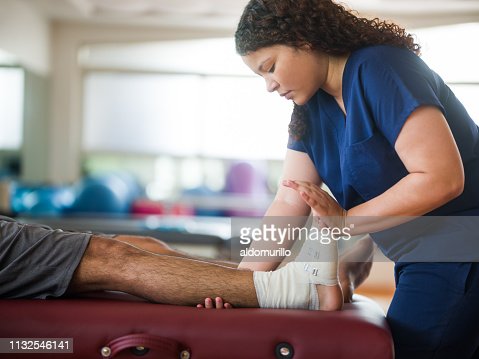It is more than just taping ankles

A female occupational therapist holding leg and foot of a male patient with a bandage in his ankle.
From a bag of ice to an outlet for support, athletes have a wide range of necessities when it comes to playing a sport, one being easy-to-access sports medicine. Athletics come with an inherent risk for injuries, leaving it up to athletic trainers to save the day. FHC provides athletes with two well-known medical professionals, CJ Strawser and Alex Coon. Together, these two have created a process to do more than simply taping an ankle and packing a bag of ice, but what exactly is that more?
CJ and Alex have been striving to make their roles as athletic trainers more than just providing aid to those who are injured; they have been working to create more of an impact on the patients that they are treating. By doing so, they have created an open-door policy. The training room has been known to be a place where athletes—in season or not—can go to hang out, talk, or in my experience, build towers out of rolls of tape. But why has the training room—a place of work— adapted to this open-door policy? CJ speaks about the importance of this by saying, “We want to make it a space where people are comfortable and they’re happy to hang out. I think that building relationships is a big part of our job, and a good way to help build relationships is to just sit and talk. It’s a good time to check in and see how people are doing just in their lives and how everything else is going.”
With the time that athletes have been known to spend around CJ and Alex, the more significant of a role they begin to play in athletes’ lives. Whether it may be giving athletes a chance to talk about themselves or simply cracking jokes, these two have made it well-known that they are here for it all. When asked if being an athletic trainer means playing a more significant role in athletes’ lives, Alex says, “100%. Along with just being here for the physical health of our athletes, we’re here for the mental health and that side of things too. And that can be challenging because there is such a stigma around it, especially at the high school level and athletes not wanting that side of them known, so we are good people to talk to.” All athletes may not be willing to pour their hearts out in the training room, but if they choose to, they will be acquainted with two people who are willing to listen and give the support that is needed.
Athletic trainers in the realm of sports medicine have become an overall essential aspect of sports due to the “abilities we have to make an impact on student-athletes outside of athletics, being here for not only the physical health but also the mental health, and the compassion that we as athletic trainers have,” says Alex. Another thing that makes athletic trainers such a crucial part of athletics—besides the basics of physical health—is “being an outlet for people to talk to as well, it is not given as much credit as it deserves,” says CJ.
Those who are providing athletes with aid and support for their physical health are not only doing that but also impacting them positively along the way. The roles and jobs of athletic trainers are more than just simply wrapping an injured area or filling up water bottles, and FHC athletic trainers have been prime examples of this. To both CJ and Alex, thank you for the impact you have made and continue to make on the athletes around you and for the environment that you have created for them all.

Luccini Rodriguez is a sophomore and this is her first year writing for FHC Sports Report. Luccini has enjoyed writing since elementary school and dreams...


